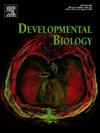Foxm1 promotes differentiation of neural progenitors in the zebrafish inner ear
IF 2.5
3区 生物学
Q2 DEVELOPMENTAL BIOLOGY
引用次数: 0
Abstract
During development of the vertebrate inner ear, sensory epithelia and neurons of the statoacoustic ganglion (SAG) arise from lineage-restricted progenitors that proliferate extensively before differentiating into mature post-mitotic cell types. Development of progenitors is regulated by Fgf, Wnt and Notch signaling, but how these pathways are coordinated to achieve an optimal balance of proliferation and differentiation is not well understood. Here we investigate the role in zebrafish of Foxm1, a transcription factor commonly associated with proliferation in developing tissues and tumors. Targeted knockout of foxm1 causes no overt defects in development. Homozygous mutants are viable and exhibit no obvious defects except male sterility. However, the mutant allele acts dominantly to reduce accumulation of SAG neurons, and maternal loss-of-function slightly enhances this deficiency. Neural progenitors are specified normally but, unexpectedly, persist in an early state of rapid proliferation and are delayed in differentiation. Progenitors eventually shift to a slower rate of proliferation similar to wild-type and differentiate to produce a normal number of SAG neurons, although the arrangement of neurons remains variably disordered. Mutant progenitors remain responsive to Fgf and Notch, as blocking these pathways partially alleviates the delay in differentiation. However, the ability of elevated Wnt/beta-catenin to block neural specification is impaired in foxm1 mutants. Modulating Wnt at later stages has no effect on progenitors in mutant or wild-type embryos. Our findings document an unusual role for foxm1 in promoting differentiation of SAG progenitors from an early, rapidly dividing phase to a more mature slower phase prior to differentiation.

Foxm1促进斑马鱼内耳神经祖细胞的分化。
在脊椎动物内耳发育过程中,感觉上皮细胞和静止听神经节(SAG)的神经元起源于谱系受限的祖细胞,这些祖细胞在分化为成熟的有丝分裂后细胞类型之前广泛增殖。祖细胞的发育受Fgf、Wnt和Notch信号的调控,但这些途径如何协调以实现增殖和分化的最佳平衡尚不清楚。在这里,我们研究Foxm1在斑马鱼中的作用,Foxm1是一种转录因子,通常与发育中的组织和肿瘤的增殖有关。有针对性地敲除foxm1不会导致明显的发育缺陷。纯合子突变体是有活力的,除了雄性不育外,没有明显的缺陷。然而,突变等位基因的主要作用是减少SAG神经元的积累,而母体功能的丧失略微增强了这种缺陷。神经祖细胞通常是特定的,但出乎意料的是,它们持续处于快速增殖的早期状态,并延迟分化。祖细胞最终转变为与野生型相似的较慢的增殖速度,并分化产生正常数量的SAG神经元,尽管神经元的排列仍然是可变的紊乱。突变祖细胞仍然对Fgf和Notch有反应,因为阻断这些途径部分减轻了分化的延迟。然而,在foxm1突变体中,升高的Wnt/ β -连环蛋白阻断神经规范的能力受损。在后期调节Wnt对突变型或野生型胚胎的祖细胞没有影响。我们的研究结果记录了foxm1在促进SAG祖细胞从早期快速分裂阶段分化到分化前更成熟的缓慢阶段的不同寻常的作用。
本文章由计算机程序翻译,如有差异,请以英文原文为准。
求助全文
约1分钟内获得全文
求助全文
来源期刊

Developmental biology
生物-发育生物学
CiteScore
5.30
自引率
3.70%
发文量
182
审稿时长
1.5 months
期刊介绍:
Developmental Biology (DB) publishes original research on mechanisms of development, differentiation, and growth in animals and plants at the molecular, cellular, genetic and evolutionary levels. Areas of particular emphasis include transcriptional control mechanisms, embryonic patterning, cell-cell interactions, growth factors and signal transduction, and regulatory hierarchies in developing plants and animals.
 求助内容:
求助内容: 应助结果提醒方式:
应助结果提醒方式:


